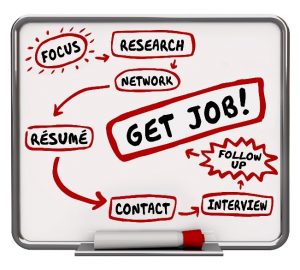So, you are finally out on your own. Perhaps you or someone you love just finished high school, trade school, or a college degree. Now it’s time to land that first job! It’s an exciting time filled with anticipation and trepidation.
exciting time filled with anticipation and trepidation.
After all, if you just finished your education, you should be equipped for your vocation of choice. But has anyone prepared you to actually land a job? This is the second of two parts that hopefully will be helpful in starting your career on the right path. In the first article, I addressed preparation for starting the application process, including the development of a good resume and cover letter.
This article will cover interviewing, the importance of interview follow-up, and other considerations as you seek employment.
Preparing for an interview
If you have developed a successful resume and cover letter, your next step is an invitation to interview for the position. If you receive a request to interview, this is a good indication that your resume did what it was supposed to do. Congratulations! You have cleared the first hurdle. As you prepare, be sure to be ready to discuss all aspects of your resume. This should be easy since you will simply be sharing your experience. However, the interview will also cover a lot of things that are not on your resume. In fact, you may be asked questions that seem irrelevant to the job itself. Why? The interviewer is trying to determine the following:
- Can and will the prospective employee quickly add value to my organization/company?
- Is the candidate a good fit for the company culture?
- Is this person teachable?
- How will this candidate handle the pressure and stress of the unexpected?
- Is this more than a job for the prospective employee and will they be happy in our environment?
- Does this person really want THIS job and do they understand the basic needs of the company?
 Any interviewee should be prepared to demonstrate a genuine interest in the position as well as the company itself. Do your research. Learn as much as you can about the company and the position you applied to fill.
Any interviewee should be prepared to demonstrate a genuine interest in the position as well as the company itself. Do your research. Learn as much as you can about the company and the position you applied to fill.
You should be prepared to show that you are confident (not arrogant), will work hard to make a difference, and understand you have a lot to learn. As the interviewee, you should always be prepared to ask good questions at the end of the interview.
Remember that the interview is a two-way street. Yes, the company wants to be sure that they will receive value from the new hire. But the prospective employee needs to know that the company is going to be a good fit as well. Adding new employees is an expensive proposition for the company.
Depending on the applicant’s situation, starting a new position can be expensive for the prospective employee, especially if a family relocation is involved or if the prospect is leaving another opportunity.
Interview Pitfalls
The following are some common and not-so-common mistakes to avoid:
- Being too polished or not polished enough—If the interviewer believes all of your answers are memorized, you will not appear genuine. On the other hand, if you do not prepare enough, you will appear uninterested. When interviewing a fresh college graduate, interviewers are primarily trying to identify cultural fit and ability to learn. Just be genuine and answer the questions truthfully. The interviewer is aware that you have limited experience.
- Answering too quickly—Many interviewers will ask complicated questions that may come as a complete surprise to you. Take your time. A good way to approach those questions is to say something like, “That’s a great question that I’ve never been asked before. May I have a minute to formulate my answer?” Then allow a minute or two to collect your thoughts before speaking. Silence is not bad. Again, be genuine in your answers.
- Answering the unasked question or rambling in your answers—Don’t bloviate. Always try to answer all questions directly. When appropriate use examples. But keep your answers concise and clear. Very important: If you don’t understand the question, ask the interviewer to repeat or rephrase the question.
- Stretching the truth—Never be untruthful or exaggerate. This is a sure way to lose an opportunity. For example, if the interviewer asks if you have experience, don’t try to bluff an answer. Chances are good that the interviewer will ask you to explain or go into depth and you will get caught. Again, for fresh college hires, it’s understood that you have limited experience.
- Asking about compensation, especially in the first interview—It is usually best to avoid compensation discussions until the interviewer brings it up. If you get to the point of closing a deal, there will be plenty of time for questions and answers. Asking about salary and benefits too early can give the interviewer the impression that compensation is all you care about. Don’t be that guy!
Following Up
 What to do at the conclusion of the interview and post interview—This step is crucial and can make all the difference in receiving an offer.
What to do at the conclusion of the interview and post interview—This step is crucial and can make all the difference in receiving an offer.
- Ask about the next steps. Many companies use a multi-step interview process. It’s possible that a company may move straight to an offer after one interview, but be prepared for more discussions. Ask about the hiring process, including timing and how to follow up. Ask for contact information for the people you spoke with during the interview.
- Always follow up. Send a short, well written thank-you note to those involved in your interview. Include the person who made the interview arrangements. Make it somewhat personal (not a form-letter response). Mention anything you particularly enjoyed about the interview or interaction with the interviewer. Also be sure to express your interest in continuing the hiring process. The format for the thank-you note can be email or US postal. Handwritten notes, although a bit old fashioned, are usually well received. If for some reason you didn’t get contact information for one of the interviewers, you can still send a note through the postal service addressed to the main company address.
- Don’t be afraid to contact the company of interest if you haven’t heard anything in the time frame promised. When you ask about next steps before leaving the interview, you may be given a time frame for the next contact. By all means, contact the company if you haven’t heard from them in the timing discussed. This demonstrates a genuine interest and may actually be a deciding factor. If you did not receive any timing information, it’s a good idea to check your status with the company within two weeks of the interview. Again, this demonstrates a genuine interest.
- Very important: Even if the company decides not to give you an employment offer, send a thank-you note for the opportunity to interview. Many times, an employment rejection simply means “not now.” Don’t burn any bridges.
Although this is written primarily to persons starting a career, this advice is also applicable to incumbent workers changing jobs or career direction. As a long-time manager and employer, I have interviewed and hired many people.
I have also coached many graduating students and seasoned professionals looking to start or change their careers. Seeking employment is not something people often do, but there is a recipe for success.
These techniques and ideas have proven to be very successful in helping employers and potential employees find a great match. I enjoy helping anyone looking to change or enhance their career. I hope that this article is helpful to you or someone you know.
–
 Paul V. Kumler, P.E., is president and founder of KTM Solutions, an engineering company that services the aerospace and large-scale manufacturing industries. KTM Solutions designs and builds custom machines and “tooling” (jigs, fixtures, below-the-hook lifting systems) supporting a broad clientele and various industries. (www.ktmmechanical.com) The company is headquartered in Greer, South Carolina, with a remote office in Charleston, South Carolina. Mr. Kumler serves in several volunteer roles including the SC Aerospace Advisory Board. Mr. Kumler, a professional engineer, is licensed in Louisiana, South Carolina, Texas, and Washington. He is married to Ginger A. Kumler. Together, they have two grown children and three grandchildren.
Paul V. Kumler, P.E., is president and founder of KTM Solutions, an engineering company that services the aerospace and large-scale manufacturing industries. KTM Solutions designs and builds custom machines and “tooling” (jigs, fixtures, below-the-hook lifting systems) supporting a broad clientele and various industries. (www.ktmmechanical.com) The company is headquartered in Greer, South Carolina, with a remote office in Charleston, South Carolina. Mr. Kumler serves in several volunteer roles including the SC Aerospace Advisory Board. Mr. Kumler, a professional engineer, is licensed in Louisiana, South Carolina, Texas, and Washington. He is married to Ginger A. Kumler. Together, they have two grown children and three grandchildren.


Be the first to comment on "Just Starting Out – Part 2"